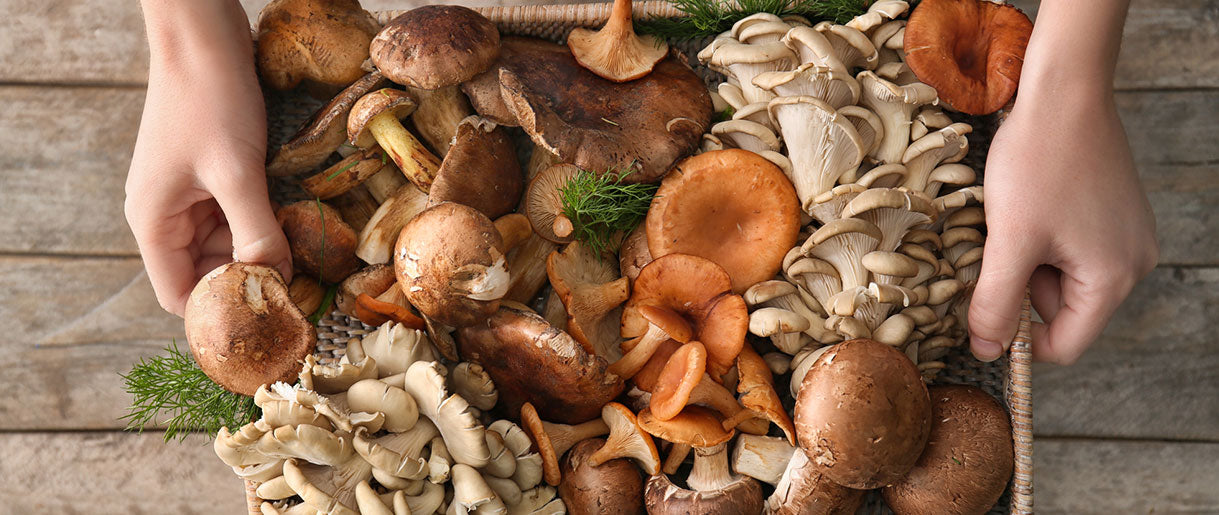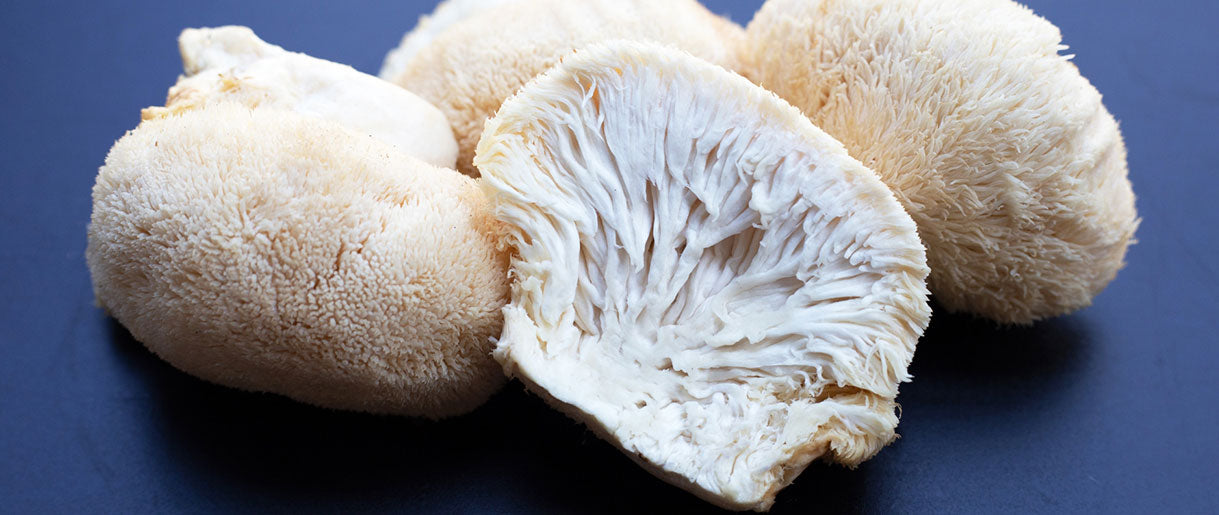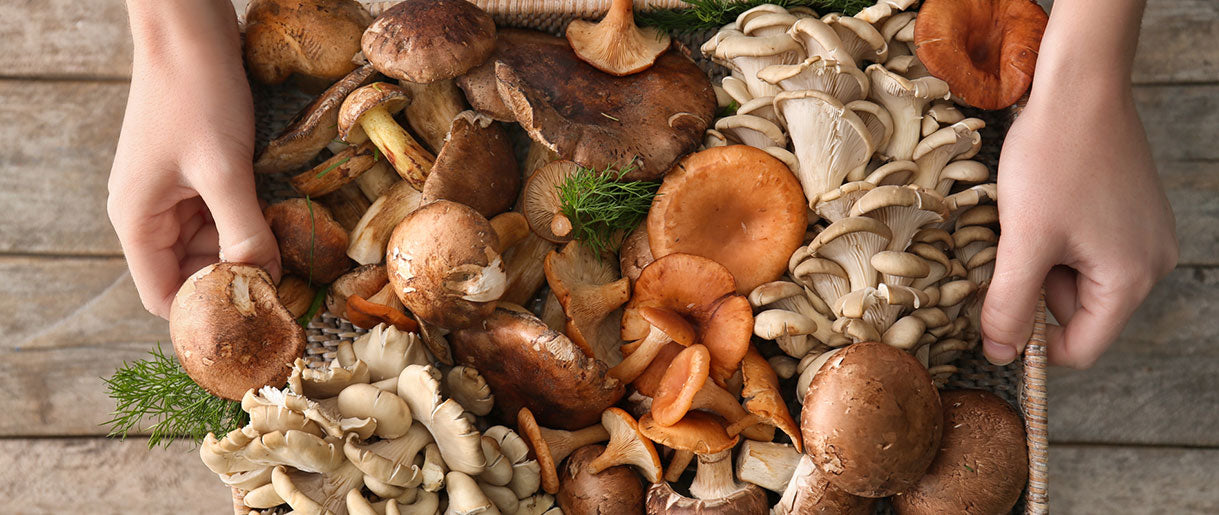Yes, mushrooms are considered vegan. The vegan diet excludes all animal products and by-products, including meat, dairy, eggs, and honey. While mushrooms are a type of fungi and not a plant, they don't have a central nervous system or the capacity to feel pain, which makes them suitable for vegan diets.
They also play a valuable role in a vegan diet because of their high nutrient content, including protein, vitamins, and minerals. As a result, mushrooms are widely used in vegan cuisine as a meat substitute due to their hearty texture and rich, umami flavor.
The connection between mushrooms and veganism, however, isn't always straightforward to everyone. After all, mushrooms are not plants but fungi, an entirely separate kingdom of life. Their unique biological characteristics and how they obtain their nutrients have sparked intriguing conversations and occasional misconceptions in the vegan community. In this article, we will delve into the world of fungi to clear any lingering doubts and discuss mushrooms' role in a vegan diet.
Mushrooms Decoded: The Vegan-Friendly Fungi

Unveiling the Mystery of Mushrooms
The world of fungi is a fascinating realm beyond the ordinary vegetables and fruits we are accustomed to. At the heart of this realm lies the mushroom, a complex organism that forms an interesting conversation among botanists, chefs, and, most notably, vegans.
Mushrooms, including popular varieties such as oyster and cremini, have unique biology. While most mushrooms share some characteristics with plants, they are not plants at all. Instead, mushrooms belong to the fungi kingdom, a separate lineage of life that includes more than just the typical 'cap and stem' mushrooms we're familiar with.
Mushrooms, often called vegan mushrooms by most vegans, can break down organic matter and convert it into nutrients. This makes them decomposers, a vital role that helps in recycling nutrients in nature. Some gourmet mushrooms, like oyster mushrooms, have even been found to grow on unusual substrates like coffee grounds, breaking down the waste and transforming it into a source of nutrients.
The Growth Cycle: From Spore to Fruiting Body
Understanding how mushrooms grow offers insights into their unique nature and suitability as vegan-friendly food. Mushrooms grow from microscopic spores, not seeds, which develop into a network of fine threads called mycelium.
The mycelium spreads underground or within its chosen food source, absorbing nutrients as it expands. The mycelium and the fruiting body of mushrooms are generally considered suitable for a vegan diet.
The Tale of Farmed and Wild Mushrooms
Wild mushrooms typically grow in forests and fields, thriving on decaying wood and organic matter. Some species, such as the beloved oyster mushroom, can often grow on fallen logs or piles of wood chips. However, farmed mushrooms, or cultivated varieties, can be grown in controlled environments, often on enriched substrates like straw, coffee grounds, or organic compost.
It's important to note that while mushrooms, including vegan mushrooms, can technically absorb nutrients from any decomposing matter, commercial mushroom farming for human consumption does not typically involve growing mushrooms on decomposing animal matter or animal manure. This crucial point assures most vegans that mushrooms, such as the oyster mushroom, are indeed vegan-friendly.
The Vegan Paradigm: Defining Vegan-Friendly Foods

The Essence of Veganism: Beyond a Plant-Based Diet
When it comes to defining what veganism means in terms of diet, it's not simply about adhering to a plant-based diet. Veganism is a lifestyle choice and an ethical stance that seeks to avoid all forms of exploitation and cruelty to animals for food, clothing, or any other purpose. This principle extends to the refusal to consume large or tiny animals and even products derived from them.
The vegan diet, therefore, includes only foods not of animal origin. This encompasses fruits, vegetables, grains, legumes, nuts, seeds, and other plant-derived foods, including mushrooms and other fungi. In short, veganism is a plant-based lifestyle that centers on respect for all life forms and the environment.
Vegan Food Selection: Guided by Ethics
The guidelines that vegans follow when choosing foods to eat are influenced by their vegan ethics. For many vegans, it's not just about avoiding foods directly obtained from animals, like meat, dairy, and eggs, but also those that involve indirect exploitation or harm to animals. This extends to products like honey, which bees produce, and certain food additives derived from animals.
However, it's important to clarify that vegans are not against the ecosystem's natural processes of life and death. For instance, mushrooms and other fungi in the wild might grow on dead animals, but this doesn't conflict with vegan principles as the mushrooms are not causing harm or exploiting these animals. They are part of nature's life cycle, helping decompose organic matter and return nutrients to the soil.
Mushrooms and Veganism: Exploring the Intersection

Do Mushrooms Fit Within the Vegan Diet?
A frequent query in the vegan community is, "are mushrooms vegan?" The short and simple answer to this is yes, mushrooms, from wild oyster mushrooms and king oyster mushrooms to shiitake mushrooms and the humble white mushroom, fit within the vegan diet. Vegans can easily eat mushrooms, assured that they align with the principles of a plant-based lifestyle.
The taste of Mushrooms includes a deep umami flavor and a meaty texture to dishes, which makes them a favorite among vegans looking for hearty, satisfying ingredients. Beyond their culinary appeal, mushrooms are packed with essential nutrients. They provide a valuable source of protein, fiber, and other essential vitamins, all crucial components of a balanced vegan diet.
Debunking Misconceptions: The Mushroom Controversy
Despite the consensus that mushrooms are vegan, some misconceptions and controversies have arisen regarding their place in a vegan diet. One such contention revolves around mushrooms' mode of nutrient absorption.
Mushrooms, including the popular portobello mushrooms and other mushrooms, are known to grow on and break down organic matter. This can range from tree stumps and dead trees in the wild to coffee grounds and straw in cultivated settings. However, a misunderstanding arises when it's assumed that mushrooms are grown on or absorb nutrients from animal matter.
In reality, commercially grown mushrooms are cultivated on plant-based materials and do not involve animal exploitation. They are, therefore, vegan and align with the ethical guidelines of veganism.
A notable exception is the truffle industry, where truffle dogs are often used for hunting. While this doesn't impact whether truffles are vegan, it has raised concerns about potential animal exploitation within this niche of the mushroom industry. However, most truffle dogs are well cared for and enjoy the activity, making it a less clear-cut issue.
The Power of Fungi: Health Benefits of Mushrooms for Vegans

Nutritional Powerhouses: What Mushrooms Bring to the Vegan Plate
Are mushrooms vegan? We've established that they are. But more than fitting into a vegan lifestyle, mushrooms provide an array of benefits and essential nutrients that make them particularly beneficial for vegans who love eating mushrooms.
Mushrooms are rich in protein, a nutrient often of concern in a vegan diet. They are a good source of B vitamins, including riboflavin, niacin, and pantothenic acid, which help the body derive energy from food and are necessary for the health of the nervous system. They also provide essential minerals like selenium and potassium.
Moreover, mushrooms are good sources of vitamin D, an essential nutrient that aids in absorbing calcium and phosphorus and is crucial for bone health. Exposure to sunlight can boost the vitamin D content in mushrooms, making them even more beneficial for vegans.
Spotlight on Varieties: Unique Benefits of Different Mushrooms
There's a wide world of mushrooms to explore, each with unique benefits. "Are mushrooms vegan?" isn't just about a general categorization. Understanding the specific advantages of different varieties can help vegans optimize their diet.
- Button Mushrooms: These common mushrooms are high in antioxidants, which can help fight the damaging effects of free radicals in the body.
- Shiitake Mushrooms: They are delicious and known for their immune-boosting properties. They are a good source of iron, making them beneficial for vegans.
- Portobello Mushrooms: Due to their meaty texture, they are often used as a meat substitute in various vegan dishes. They are high in fiber, and their large size makes them a good source of potassium.
- Cremini Mushrooms: Also known as baby bellas, these mushrooms have a high selenium content, which supports the immune system and thyroid health.
Mushrooms are not only vegan but are also a nutrient-dense food option that can play a vital role in a vegan diet. So, the next time someone asks, "Are mushrooms vegan?" don't just confirm; share the excellent health benefits these fantastic fungi offer!
Savoring Fungi: Vegan Recipes Featuring Mushrooms

Are you ready to consume mushrooms in a whole new light? While often typecast as a side dish or pizza topping, the mushroom deserves to be the star of the plate in vegan cooking. Not only are these vegan mushrooms a powerhouse of nutrition, but their hearty texture and deep umami flavor also make them versatile ingredients that can add depth and satisfaction to various dishes.
From a comforting vegan mushroom soup to crowd-pleasing vegan stuffed mushrooms, the culinary potential of mushrooms in a vegan kitchen is vast. Whether you're using store-bought varieties or growing your own vegan mushrooms, here are a few mouth-watering recipes to inspire your culinary adventures.
Recipe 1: Comforting Vegan Mushroom Soup
A bowl of vegan mushroom soup is like a warm hug on a cold day. This recipe is simple, comforting, and the perfect showcase for the earthy flavor of mushrooms.
Ingredients:
- 500g mixed mushrooms
- 1 onion, finely chopped
- 2 cloves garlic, minced
- 1-liter vegetable stock
- 1 can of coconut milk
- Salt and pepper to taste
- Olive oil for sautéing
Instructions:
1. Sauté the onion and garlic in olive oil until soft and fragrant.
2. Add the mushrooms and cook until they release their liquid and start to brown.
3. Add the vegetable stock and bring to a simmer.
4. Blend half of the soup to create a creamy texture, then return to the pot.
5. Stir in the coconut milk and season with salt and pepper.
6. Serve this hearty vegan stew hot, garnished with fresh herbs if desired.
Recipe 2: Vegan Stuffed Mushrooms
Vegan stuffed mushrooms make an excellent appetizer or side dish for a dinner party. They're easy to make, delicious, and sure to impress your guests.
Ingredients:
- 12 large button mushrooms
- 1 cup cooked quinoa
- 1 onion, finely chopped
- 2 cloves garlic, minced
- 1 red bell pepper, finely chopped
- 2 tbsp soy sauce
- Olive oil for sautéing
- Salt and pepper to taste
Instructions:
1. Preheat your oven to 375°F (190°C).
2. Remove the stems from the mushrooms and finely chop them.
3. Sauté the onion, garlic, chopped mushroom stems, and bell pepper in olive oil until soft.
4. Stir in the cooked quinoa and soy sauce, and season with salt and pepper.
5. Stuff each mushroom cap with the quinoa mixture and place it on a baking tray.
6. Bake for 20 minutes until the mushrooms are tender and the filling is heated.
Interesting Read: See more Lion's Mane mushroom recipes for more tasty vegan meals.
FAQs About "Are Mushrooms Vegan"
Can Fungi Feel Pain?
Fungi, including mushrooms, do not have a nervous system, which is required for an organism to feel pain. Therefore, it is generally accepted by the scientific community that fungi cannot feel pain.
In animals, pain is a complex process involving a series of rapid-fire communications between cells in response to a harmful stimulus. This process starts with sensory receptors called nociceptors, which detect damage to the body's tissues. The nociceptors then send signals through peripheral nerves to the spinal cord and, from there, to the brain, which interprets these signals as pain.
Fungi do not possess these physiological mechanisms. They don't have a brain, sensory nerves, or nociceptors. While fungi can respond to environmental stimuli and show a form of adaptability and communication through the transmission of chemical and electrical signals, this fundamentally differs from the subjective experience of pain that animals are capable of.
This is one of the reasons why eating fungi, like mushrooms, is generally considered compatible with a vegan or vegetarian diet, which seeks to avoid causing pain or harm to animals.
How Do Mushrooms Taste?
The taste of mushrooms can vary widely depending on the variety. Still, generally, they have a uniquely savory, earthy flavor that's often described as "umami" – the fifth basic taste after sweet, salty, sour, and bitter. This umami flavor is rich, deep, and complex and can add depth to dishes.
Here's a rough breakdown of how some common types of mushrooms taste:
- Button Mushrooms: These have a mild, subtle flavor that can blend well with many dishes.
- Cremini Mushrooms: They taste similar to button mushrooms but are a bit more flavorful and have a meatier texture.
- Portobello Mushrooms: These mature cremini mushrooms have a deep, meaty flavor. They're often used as a meat substitute in vegetarian and vegan dishes due to their hearty texture.
- Shiitake Mushrooms: These have a smoky and rich flavor that can be quite pronounced. They're very savory and slightly chewy.
- Oyster Mushrooms: They have a delicate, mild flavor with a hint of sweetness and a velvety texture.
- Chanterelle Mushrooms: Chanterelles have a unique fruity, peppery taste with a hint of earthiness.
- Morel Mushrooms: Morels have a rich, nutty flavor highly prized in many cuisines.
- Porcini Mushrooms: They have a robust, nutty flavor that's highly sought after, particularly in Italian cuisine.
Remember, the taste of mushrooms can also be influenced by how they're cooked and what ingredients they're paired with. For instance, they can absorb flavors like garlic or herbs very well, complementing and deepening their natural taste.
Which Types Of Vegan Mushrooms Can I Grow At Home?
Growing your own mushrooms at home can be a rewarding experience. You can grow vegan-friendly mushrooms and enjoy fresh mushrooms from your home garden. Here are some types of mushrooms you can consider:
- White Button Mushrooms: These are among the easiest varieties to grow at home. They're also the most common type of mushroom and are great for various dishes.
- Oyster Mushrooms: Oyster mushrooms grow quickly, require minimal maintenance, and can be grown on various substrates such as coffee grounds, straw, or wood. They're also known for their delicate flavor and texture.
- Shiitake Mushrooms: These are another popular variety for home cultivation. They are typically grown on hardwood logs or sawdust blocks but require more patience, as they can take several months to produce.
Remember, each variety of mushrooms has specific growing requirements, including optimal temperature, humidity, light levels, and substrate (growing medium). Kits for growing mushrooms at home can be a great way to get started, as they provide you with everything you need and detailed instructions.
Key Takeaways
To conclude, let's revisit our central question: Are mushrooms vegan? Absolutely! As we've discovered, mushrooms are fascinating fungi that are indeed vegan-friendly. They are not part of the animal kingdom and have no central nervous system. Hence, they don't experience pain, aligning perfectly with the vegan ethos of causing the least harm to sentient beings.
Mushrooms obtain their nutrients from decomposing organic matter. This often involves plant-based materials like wood chips or coffee grounds, and not typically animal by-products. So whether farmed or foraged, most mushrooms fit nicely within a vegan lifestyle.
Furthermore, mushrooms offer a rich source of essential nutrients often sought in a vegan diet, including protein, vitamins, and minerals. Their robust, umami-packed flavor profiles and meaty texture make them an incredible asset in vegan cooking, able to transform the simplest of dishes into gourmet creations.
We hope this mushroom kingdom exploration has been informative and intriguing. If you have any personal insights or experiences with mushrooms in your vegan journey, please share them in the comments below. We love hearing from our readers and learning about the diverse ways you incorporate vegan-friendly foods into your lives. So, go ahead; let's continue this mushroom conversation!










Let Us Know Your Comments